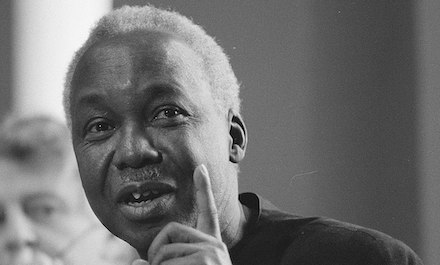Julius Nyerere, one of Africa’s brightest lights. Photo: Wikimedia Commons.
May 25 is a day set aside to mark Africa Day and it’s here again. Africans at home and abroad join hands once more to celebrate the 58th Africa Day anniversary with numerous events to mark the occasion.
Celebrations to mark the formation of the Organization of African Unity (OAU), now replaced by the African Union (AU), will be held under the theme: “Arts, culture and heritage: Levers for building the Africa We Want.” Most of the events will be held virtually given the on-going the disruptions created by the COVID-19 pandemic.
Despite the numerous changes and transformation of the continent’s social, economic and cultural sectors, we must never forget that arts, culture and our heritage still inform our past, present and future. It’s the heart and soul of what defines us as Africans. I strongly believe that the AU theme makes a passionate appeal to us as Africans to revisit our roots and our soul to reset and reboot our way of thinking that denigrates, ridicules and distorts our way of life.
There are still many stereotypes and racial abuses that victimize Africans. Much of this is borrowed from the colonial and post-colonial westernized mindset that barely recognize Africans as equal partners on the global political stage. Powerful countries continue to subdue and hurl everything they can find at this collective African spirit that seeks to bind, integrate and ensure Africans have control of their destiny and resources. Despite this assault, the African spirit still lives on, unbowed by the divisive and dominant policies of powerful countries, which aim to exploit for next to nothing Africa’s economic resources.
Africa Day provides an opportunity to celebrate that African solidarity, African identity and a common humanity and destiny which is shared by the continent’s more than one billion people. After nearly six decades of the existence of an organization dedicated to African Unity, it is a time for reflection for this continent that is strategically important to world economics.
We need to keep our heads up and walk solidly together to adopt a forward—looking and re-shaped mindset that will enable us to exercise higher levels of ownership, leadership, and service for the good of the continent’s estimated 1.3 billion people. Numerous challenges still haunt the African continent. Africa today still hopes to thrive under difficult circumstances characterized by lockdowns and despair brought about by the outbreak of the novel coronavirus pandemic.
This pandemic has forced the continent to shift its attention to the fight for survival. Many people are dying and others are barely surviving the pandemic. The continent needs to continue with vaccination programs and efforts to promote research and development of drugs as well as the push to manufacture vaccines locally. If we do not place much emphasis on manufacturing the vaccines locally and promoting R&D in Africa, we will pay a heavy price as major suppliers become inward looking. Whether Africans live or die will be decided by foreign nations and pharmaceutical companies.
Despite the threats, the continent must keep up its momentum for continental integration and meet the challenges that lie ahead. The signing of the African Continental Free Trade Area (AfCFTA) agreement on March 21, 2018 was a historic positive development. The agreement took effect on Jan. 1, 2021 but its implementation has been slowed down by the pandemic.
On Africa Day we should commemorate the victory of the African people in their struggle for freedom and independence. The AU, in many ways symbolizes our hopes and wishes for unity, peace, stability and sustainable development.
Even with the many challenges, Africa has made considerable progress in socio-economic, scientific, technological, and cultural development. The continent is playing an increasingly prominent role in building a just and democratic multi-polar world order. Our voice should count.
The dream of our founding fathers who gathered together on May 25, 1963 in Addis Ababa to establish the OAU—now the AU—to come up with a united, independent and strong Africa, must not be in vain. They dedicated their lives and worked tirelessly to liberate Africa from the shackles of colonialism.
Now our task is to achieve economic independence for Africa.
Kwame Nkrumah shown with Kennedy during an official visit to the U.S. Yet the U.S. was involved in the coup that deposed him in 1966.
Photo: JFK Library.
The OAU was established, first and foremost, with the express objective of working towards the greater unity of the African continent while at the same time ensuring that the remaining colonies on the African continent are assisted to achieve their freedom and independence.
These were some of the prominent Pan-African nationalists: Dr. Kwame Nkrumah of Ghana, Modibo Keita of Mali, Gamal Abdel Nasser of Egypt, Sekou Touré of Guinea, Julius Nyerere of Tanzania, Ben Bella of Algeria, Emperor Haile Selassie of Ethiopia, William Tubman of Liberia, Abubakar Tafawa Balewa of Nigeria, Nnamdi Azikiwe of Nigeria, Jomo Kenyatta of Kenya, and many others.
Their vision inspired the pan-African movement and also influenced the transformation of the continental body in the years that followed.
These founding fathers must continue to be part of our collective memory as the continent continues to celebrate their work and soldier on in achieving their dreams. The African spirit must live on, unbowed by the divisive and dominant policies of powerful countries, which aim to exploit for next to nothing Africa’s economic resources.
Africa’s resources must create wealth and prosperity for Africans.
Sifelani Tsiko is a veteran journalist based in Harare, Zimbabwe. Reach him at [email protected]








